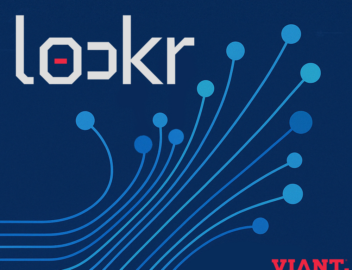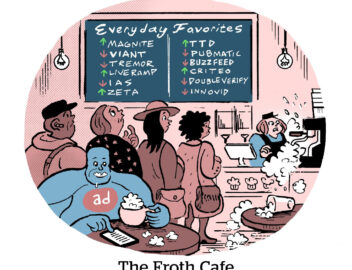

Thank you!
Just one more thing before you go...

Founder Interview: TopTierStartups.com
Keith Petri Is Building the Next Big Thing in Email and Digital Identity Management
Is there a way to finally make digital content providers respect consumer consent and communication preferences?
Starting Up
What made you decide to start your own business?
I have always been entrepreneurial-minded and have successfully built and sold businesses in the past. I started lockr because I saw a need in the market and had an ambition to positively impact the future of the internet and digital identity.
How did you come up with the idea for your startup?
I spent a decade as a data broker in the AdTech industry. New privacy regulations have highlighted issues around data ownership and usage, consent, and privacy to consumers. Advertising-friendly solutions do very little to account for consumer needs and interests, while many consumer-oriented solutions fundamentally threaten the monetization of the open and free web. I felt there was a need in the market to represent the interests of the consumer, yet in a way that will preserve the economics of the internet.
Solving a Need
Who is your startup most useful for?
Our B2C product, lockrMail, is an essential tool for anyone using email on a daily basis. More specifically, we have found our power users are often consumers who enjoy online shopping, subscribe to many newsletters, or manage multiple inboxes. Our B2B product, Identity lockr, is useful for all publishers and websites that rely on first-party data and value a quality audience.
What problem does your startup solve, and how would you say it relieves “pain” for your customers?
As more websites require an email address to view content, the volume of promotional emails that consumers receive on a daily/weekly/monthly basis is skyrocketing. As consumers, we are wasting valuable time sorting and deleting irrelevant emails, often missing some of the more important or interesting promotions. Our B2C product, lockrMail, acts as a gatekeeper, giving consumers the power to limit and curate what emails they see, from whom, and when.
On the B2B side, Identity lockr prevents registration to websites with machine-generated emails. As consumers are becoming overwhelmed with promotional emails, many are turning towards machine-generated email solutions that allow them to create a new email address for every website. This poses a significant threat to the advertising-fueled internet as it significantly limits identity matching. Identity lockr prevents sign-ups with machine-generated emails in real time and encourages sign-up with a more persistent email address. As part of the Identity lockr offering, we also have a single sign-on solution and consent management platform, which is an enormous benefit to both our lockrMail users and our publisher partners.
Raising Funds
Have you tried to raise funding? Why or why not?
Yes, we have raised just over $1 million from angel investors since our inception in late 2020. As a company with a consumer product looking for mass-market adoption, it is vital for us to have the right investors on board, with an understanding of the immediate revenue opportunity but balancing it against the greater future vision.
If you’ve tried and succeeded, how hard was it to raise funding?
Fundraising is extremely time-consuming, which I view as the most challenging aspect. It’s not easy to run a business and raise funds at the same time. Overall, however, we have been successful so far, largely due to our network and unique perspective on the current state of the market.
Cash Flow and Exits
When is the company expecting to be cash flow-positive?
We are currently offering lockrMail and Identity lockr as free products as we prioritize scale, which is essential for our go-to-market strategy. However, we plan to introduce revenue models in 2023 and are exploring a number of options.
Marketing
What are some marketing strategies that have worked for you?
We have found the most success through paid media. Since we have a free consumer product, we have to be very mindful of our customer acquisition cost, and paid search has proven to be a steady source of relatively inexpensive inbound leads.
We also got great exposure through our two launches on Product Hunt and similar startup discovery sites. On the B2B side, we have seen success with public relations, specifically a series of thought leadership pieces in industry publications.
Was there any strategy that worked well early in the business but isn’t as useful now?
Early on at lockrMail, we conducted individual one-on-one onboarding with every new user. It was extremely valuable because it allowed us to really explain how lockrMail worked. It helped engagement as users were more likely to invest their time in lockrMail after they had already spent time onboarding, and we saw a strong correlation with referrals as users felt more confident sharing the product with their network. Ultimately, however, this approach just wasn’t conducive to our goal of scaling to thousands and thousands of users, so we needed to pursue marketing avenues with a greater ability to scale.
Competitors
Who do you believe to be your biggest competitors? How do you differ from them?
For our lockrMail product, we have two primary competitor sets. The first is machine-generated email services, such as Burnermail, Cloak, Apple Hide My Email, or Firefox Relay. We offer the same level of anonymity across the web and an alternative email so consumers can keep their personal email private. However, we differ in that we offer just one persistent email alias (rather than multiple) and we include significantly more features for inbox management, including automated filters, delivery windows, digests, etc.
Our secondary competitor set for lockrMail is inbox management tools, such as Leave Me Alone or MailmanHQ. lockrMail differs from these in that we provide consumers with a new unique public-facing email and we do not authenticate into their personal email accounts. However, we do have a new product in the works to be announced soon that does offer closer functionality to this competitor site.
For the Identity lockr, there are a number of SaaS email verification tools in the market but none that completely specialize in preventing machine-generated emails in real time for publishers, brands, and retailers. We also differ significantly in that we own and operate lockrMail, which gives us access to verified data that can be shared with publishers if the user consents to it.
Hiring and Employment
What criteria do you consider when hiring employees?
We look for smart, collaborative, and hard-working individuals who are also entrepreneurial. We are an incredibly lean team, and in order to be effective, we need employees who are problem-solvers and unafraid to take on many projects at once.
The Future
What does the company’s trajectory look like over the next five years?
In the next five years, lockrMail will have millions of users, and Identity lockr will be integrated across many comScore top 250 publisher sites. lockr will also have introduced a suite of consumer-first products, making it a household name in digital identity management.
What are the biggest challenges your industry will face in the next five years?
The deprecation of the cookie will theoretically happen on Google Chrome in 2024, and publishers are already looking for new identity solutions. As major tech companies such as Apple introduce machine-generated emails, there is an enormous risk that the power of Big Tech will grow even further as they will be able to completely control identity on the internet.
General
What metrics do you consider the most important when monitoring the health of your startup?
At the moment, since we are laser-focused on scale, we are primarily concerned with user growth and user retention for lockrMail, as well as publisher growth for Identity lockr.
Tools
What pieces of technology does your startup swear by?
Shortcut (fka Clubhouse), Slack, DocSend, Zoom, Figma, and Loom.
What productivity tools do you use?
Superhuman, lockrMail, and Calendly.
View the original article on TopTierStartups.com.

Machine-Generated Email Cost Calculator
Unlock additional revenue by integrating with Identity lockr.
Select your industry vertical.
How many registered users or newsletter subscribers do you have?
Average monthly emails sent to each subscriber per month?
What is your average email open rate?Optional
What is your average email click rate?Optional
Has lockr previously analyzed the machine-generated emails in your first-party data?
What was the percentage?
Enter your RPM (page revenue per 1,000 sessions).
What is your average monthly subscriber growth rate?
What is your anonymous web visitors monthly pageview traffic?
What is your authenticated monthly pageview traffic?
Projected Incremental Revenue
Projected Annual MGE Overhead
| MGE Fees | $0 |
| MGE Lost Email Revenue | $0 |
| MGE Advertising Leakage | $0 |
| One month of Email Jail | $0 |
| Incremental Revenue | $0.0M |
Enter your email to receive the full report.
Are you sure you want to leave?
Changes you made will not be saved.







